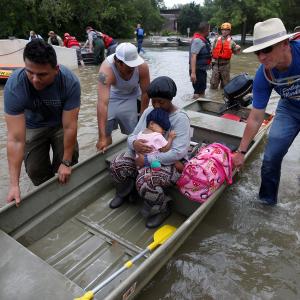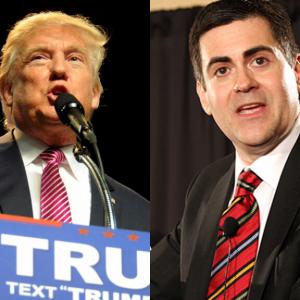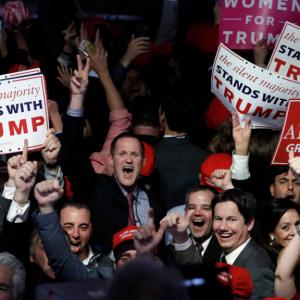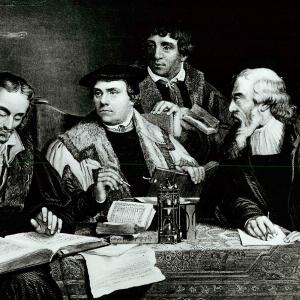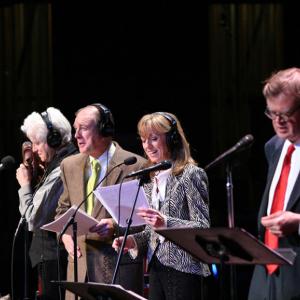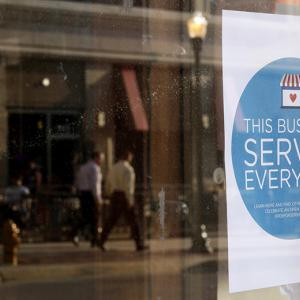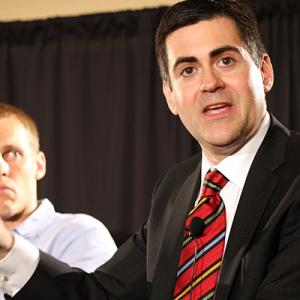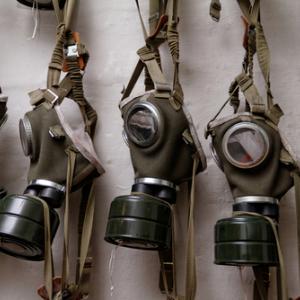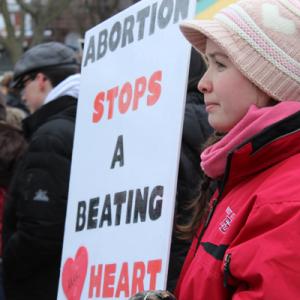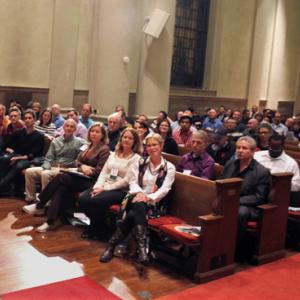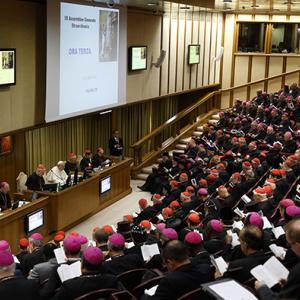Jacob Lupfer is a doctoral candidate in political science at Georgetown University. His website is www.jacoblupfer.com. Follow him on Twitter at @jlupf.
Posts By This Author
A Faith to Weather the Storm
How does faith speak to the storms of life that are literal? This question comes into sharp focus as a massive tropical storm inundates a populous coastal area with endless rain and epic flooding. Before, during, and after dangerous weather events, dearly held beliefs face profound challenges.
Russell Moore’s Evangelical Critics Are More White Than Christian
The pro-Trump evangelicals suffer from a spiritual crisis, not a political one.
Moore has challenged the foundations of conservative evangelical political engagement because they desperately needed to be shaken. For 35 years, the old-guard religious right has uncritically coddled, defended, and promoted the Republican Party.
For Good or For Ill, White Christian America Is Still Alive
Americans voted largely along the lines of race, education, and party identification. Nonwhites strongly preferred Clinton, while whites decisively chose Trump. Compared with past Republicans, the businessman received a stunning surge of votes from non-college-educated white voters.
None of this is surprising.
And yet the result upends so much conventional wisdom.
Does the Reformation Still Matter?
On Monday, Oct. 31, in Sweden, Pope Francis will take part in an ecumenical service commemorating the beginning of the Protestant Reformation’s 500th year.
It is stunning to think the start of this momentous anniversary features a visit from the Roman pope.
And it raises a question: Does the Reformation still matter?
The Christian Intellectual Tradition Is Alive and Well

Image via Gert Hochmuth/Shutterstock.com
In 1947 and 1948, respectively, Christian scholars C.S. Lewis and Reinhold Niebuhr appeared on the cover of Time magazine.
Since then, commentators have bemoaned the disappearance of the Christian intellectual.
Powerful social changes are behind the apparent decline: increasing pluralism, secularization, the decline of Protestant hegemony, and the supposed triumph of science over faith as the best way to understand the modern world.
How ‘A Prairie Home Companion’ Made American Religion Real
A stalwart liberal, Keillor generally resisted the temptation to intertwine religion and politics, both on the show and in his own life. But when religious conservatives dismayed by the leftward tilt of the mainline denominations wonder what makes those pew dwellers tick, Keillor embodies the answer.
On Issue of Race, Southern Baptists Must Move From Gestures to Action

Image via Matt Miller / Baptist Press / RNS
In recent years, Southern Baptists have made racial reconciliation a top priority.
This week, delegates (called “messengers”) to the SBC’s annual meeting in St. Louis overwhelmingly passed a resolution urging Christians to “discontinue the display of the Confederate battle flag.”
Why United Methodists' Chaos on Sexuality Issues Will Continue
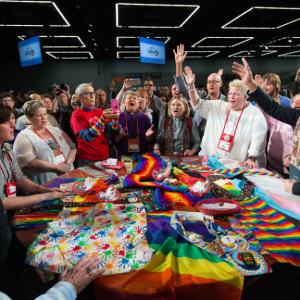
Image via Mike DuBose / UMNS / RNS
While many evangelical church bodies have reiterated their “no” to homosexuality — and most mainline Protestant traditions have said “yes” — the United Methodist Church, which concluded its quadrennial meeting last week, remains as divided and muddled as ever.
How to Foster a Civil Debate on Abortion

Image via Yongcharoen_kittiyaporn / Shutterstock.com
The news that Planned Parenthood CEO Cecile Richards will speak at Georgetown University reignited a perennial debate about freedom and identity in religious universities, particularly Catholic institutions.
On Ash Wednesday, the Church Tells the Truth

Image via Lisa Missenda/Shutterstock.com
“You are dust, and to dust you shall return.” Every year on Ash Wednesday, I seek out some member of the clergy to say those words to me. They come from the curse of mankind in Genesis 3, but I find blessing in hearing them in the tale of the loving purposes of God.
In Meeting Kim Davis, Pope Francis Confounds and Challenges
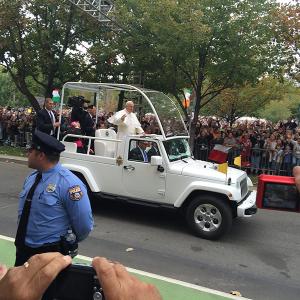
Pope Francis passes the crowd along the street of Philadelphia on September 27, 2015. Photo via Kimberly Winston / RNS
Pope Francis’ visit to the United States last week was a huge hit with the media and with the public. This week, Americans may have wondered whether he would provide ongoing unity and inspiration for our public discourse, or whether we would return to culture warring and ideological sniping.
Liberals inside and outside the Catholic Church noted that the pope made only brief allusions to abortion and same-sex marriage but spoke at length about immigration, climate change, and economic inequality.
Yet as progressives were ebullient, news broke Sept. 29 that Pope Francis met privately with Kim Davis, the Kentucky county clerk who refuses to sign marriage licenses for same-sex couples.
What Catholics Can Teach America About Polarized Politics
Nothing serves the interests of political parties more than interest groups that use religious rhetoric to promote secular ideologies and add, “Thus saith the Lord.” And Washington is full of them.
American Catholics see how partisan polarization has strained their church and their consciences. Yet unlike religious ideologues of the right and left, they are uneasy with this new development. Neither party offers a platform that stands in solidarity with unborn children, the poor and hungry, undocumented immigrant families, the environment, and people without access to medical care.
Coercion or Persuasion? On Religious Liberty and LGBT Rights
The limiting of religious freedom is a perpetually contested question in American public life. Most recently, as states consider new laws and the U.S. Supreme Court prepares to rule on same-sex marriage, gay rights supporters and traditionalist Christians appear to be on a collision course.
To make matters worse, whenever disputes between gay couples and conservative Christian wedding vendors arise, a well-funded professional grievance industry sends lawyers and media handlers out to convince the public that this is the great civil rights issue of our time.
As a new prevailing cultural consensus on homosexuality displaces a former one, it remains to be seen how the winners will treat the losers. From laws that impose punitive fines to rhetoric that places “religious liberty” in quotation marks so as to diminish it, the culture war’s apparent victors have not accorded religious freedom its due place of prominence in our public life.
The present tension between religious liberty and LGBT rights is unsustainable, but it is not insurmountable. Activists on both sides have been short on empathy for each other. Leaders have every incentive to portray their opponents as evil retrogrades hellbent on destroying society.
The Southern Baptists' Challenge on Race
In the wake of tragic shootings of unarmed black men at the hands of vigilantes and white police officers, many institutions across American society, from the president on down, have sought to foster “national conversations” about race.
Perhaps surprisingly, an agency of the Southern Baptist Convention is sponsoring one of the most important and fruitful such conversations. The SBC’s public policy arm, the Ethics & Religious Liberty Commission, has hosted a summit on racial reconciliation last week in Nashville, Tenn.
Founded in 1845 in a split over slavery, the SBC has made laudable efforts to overcome its racist past. Some moderate and liberal Southern Baptist leaders prophetically denounced racism and supported the civil rights movement, but those very leaders were forced out of the denomination during a period of conservative resurgence in the 1980s. Today’s SBC leaders are in the tenuous position of saying that moderates were right about race but wrong about everything else.
Southern Baptist leaders are determined to challenge the lingering indifferent or crude attitudes on race where they still exist among the denomination’s mostly white, mostly Southern constituency.
Charged with carrying out the SBC’s political priorities, the ERLC is best known for its advocacy for religious freedom and against abortion and same-sex marriage. Yet in the wake of unrest over last year’s deaths of Michael Brown in Ferguson, Mo., and Eric Garner in Staten Island, N.Y., the ERLC hastened its plans to hold a summit on race.
The Nashville event drew more than 500 clergy, lay leaders, and seminarians from across Southern Baptist life. Thousands more watched a live stream online. The speaker lineup was male-dominated but was decidedly mixed race. The ERLC was much more eager to hear from ethnic minorities at this summit than it was to hear from gay people at its fall conference on homosexuality.
While the sexuality conference projected certainty and unanimity — acceptance of homosexual expression is inconsistent with Christianity and will not be tolerated in Southern Baptist churches — white Baptists came to their race summit with genuine humility and a spirit of repentance for the harm racism has caused.
Dean Inserra, lead pastor of City Church in Tallahassee, Fla., challenged the audience: “When you say a school or neighborhood has ‘gone downhill,’ what are you saying?”
Conceding his own need for greater empathy, Inserra recalled asking a black clergy colleague to help him understand how police violence affects black communities.
Americans of Faith Must Reconsider Stands on Nuclear Weapons
Setsuko Thurlow was 13 when “progress” came to Hiroshima in a white-hot flash. In the dark silence following the nuclear bomb blast, Thurlow recalls children crying, “Mama, help me. God, help me.”
Her sister lived for four days. Many of her 351 dying schoolmates “looked like skeletons with skin hanging from their bones.”
They perished in agony.
Today, Thurlow and other survivors travel the globe, sharing their stories with a new generation for which nuclear weapons are an afterthought — seemingly a hypothetical and abstract threat.
The end of the Cold War had a mixed effect on the nuclear equation. Through dogged diplomacy and effective institutions, disarmament continues, though at a slower pace in recent years. There are now 10,000 operational nuclear warheads in the world, down from a high of 64,000 in 1986.
But the specter of nuclear terrorism and regional conflicts between nuclear weapons states makes nuclear weapons even more dangerous in our international system. Deterrence theory, which governed strategic thinking during the Cold War, is a much less compelling framework today.
Thankfully, most states have forsworn these armaments. Nuclear weapons are not vital to any state’s legitimate security interest. No state or NGO has the capacity to respond to the unfathomable humanitarian crisis that would follow an accidental or intentional use of a nuclear weapon.
Thus a growing global consensus now acknowledges the extreme risk nuclear weapons pose.
Pope John XXIII stated unequivocally in his 1963 encyclical “Pacem in Terris,” “Nuclear weapons must be banned.”
The Religious Politics of Abortion Are More Nuanced Than We Think
Abortion politics are never very far beneath the surface in American life, but every year around the anniversary of the Supreme Court’s landmark Roe v. Wade decision, handed down Jan. 22, 1973, they take center stage.
The annual March for Life on Jan. 22 will draw more than 100,000 demonstrators to Washington. Religious conservatives will march in protest, firm in their belief that abortion should not only be considered a sin, but also a crime.
And religious liberals, though often skeptical about the morality of abortion, will affirm their belief that a decision to end a pregnancy should be left solely to a woman, her doctors, and her conscience.
In the years after Roe v. Wade, most evangelicals came alongside the Roman Catholic Church to oppose legal abortion. Mainline Protestants, at least among denominational elites, strongly advocated for abortion rights, even though mainline clergy are evenly divided on the legality of abortion and do not talk about it much.
But while conservative religious activists at the March for Life and progressive religious leaders supporting the Religious Coalition for Reproductive Choice do speak for a subset of the people they purport to represent, the absolutism of polarized activist elites betrays the more ambivalent views of rank-and-file Americans.
Gay Debate Challenges Traditional Definitions of ‘Evangelical’
It used to be that defining an “evangelical” was pretty straightforward: some version of a “born-again” experience, a deep appreciation for the Bible as the written Word of God and a conviction to spread salvation to the masses.
Opposing homosexuality wasn’t part of that holy trinity, but for most evangelicals, it was more or less a given that all sexuality outside of man-woman marriage is sinful. Not so much anymore.
Growing cultural acceptance of homosexuality is leading many Christians to reconsider their historic opposition. As intractable as the debate itself can be, American evangelicals nonetheless are experiencing lively conflicts over maintaining boundaries. What can you believe about gays and still call yourself an evangelical? And who gets to decide?
In October, the Vatican’s Synod on the Family and a major conference of establishment evangelicals in Nashville both featured softer rhetoric on gays and lesbians while reaffirming the view that homosexuality is morally disordered.
Last week in Washington, however, a gay evangelical activist laid out a biblical argument for an affirming view.
Matthew Vines was raised in a conservative Presbyterian congregation in Wichita, Kan. Realizing and accepting that he was gay, Vines neither abandoned religion nor sought out a more affirming church. Instead, he delved deeply into the Bible and Christian teaching. He came away with the conviction that biblical Christianity could affirm same-sex relationships.
Conscience vs. Authority at Pope Francis’ Synod on the Family
A midpoint report from this month’s Synod of Bishops reveals that Catholic leaders are considering more conciliatory language toward gays and lesbians, divorced and remarried Catholics, and couples who live together before getting married.
Meeting with nearly 200 senior prelates and several dozen lay experts and observers at the Vatican, Pope Francis has deliberately engineered a lively discussion of issues concerning marriage and family life. This assembly, and a follow-up summit in 2015, will help shape the pontiff’s legacy.
Reporters and commentators are producing a flurry of analysis mostly centered on the question of whether the synod portends a change in substance or merely a change in tone. Such is the abiding question of Francis’ papacy.
Yet through these lively debates in Catholic life runs a theme that is as old as the Reformation: the role of individual conscience.
Religious Leaders' Near-Unanimous Support for Immigration Reform
One of the most meaningful things I get to do in my work as a Ph.D. student in political science is assist Jim Wallis with a course he teaches at Georgetown every fall titled "Faith, Social Justice, and Public Life." Jim is well known as the founder and leader of Sojourners and as a lifelong advocate for social justice. Through lectures, discussions, and guest speakers, our students learn about how and why clergy and lay people of various religious backgrounds advocate for public policies as expressions of their faith commitments. This fall, the push for comprehensive immigration reform was one of the case studies we examined with our students.
I'm no expert in immigration policy. But, as a political scientist, I can offer an informed assessment about when, why, and how the House of Representatives will pass the reform in 2014. This will be the subject of a future post. For now, though, I want to highlight some distinctive features of the debate that I have noticed as an observer of religion in American politics. I do have a layman's interest in the theological justifications being offered in support of (and, perhaps surprisingly, against) comprehensive immigration reform. But for now, I will focus mostly on the politics.
